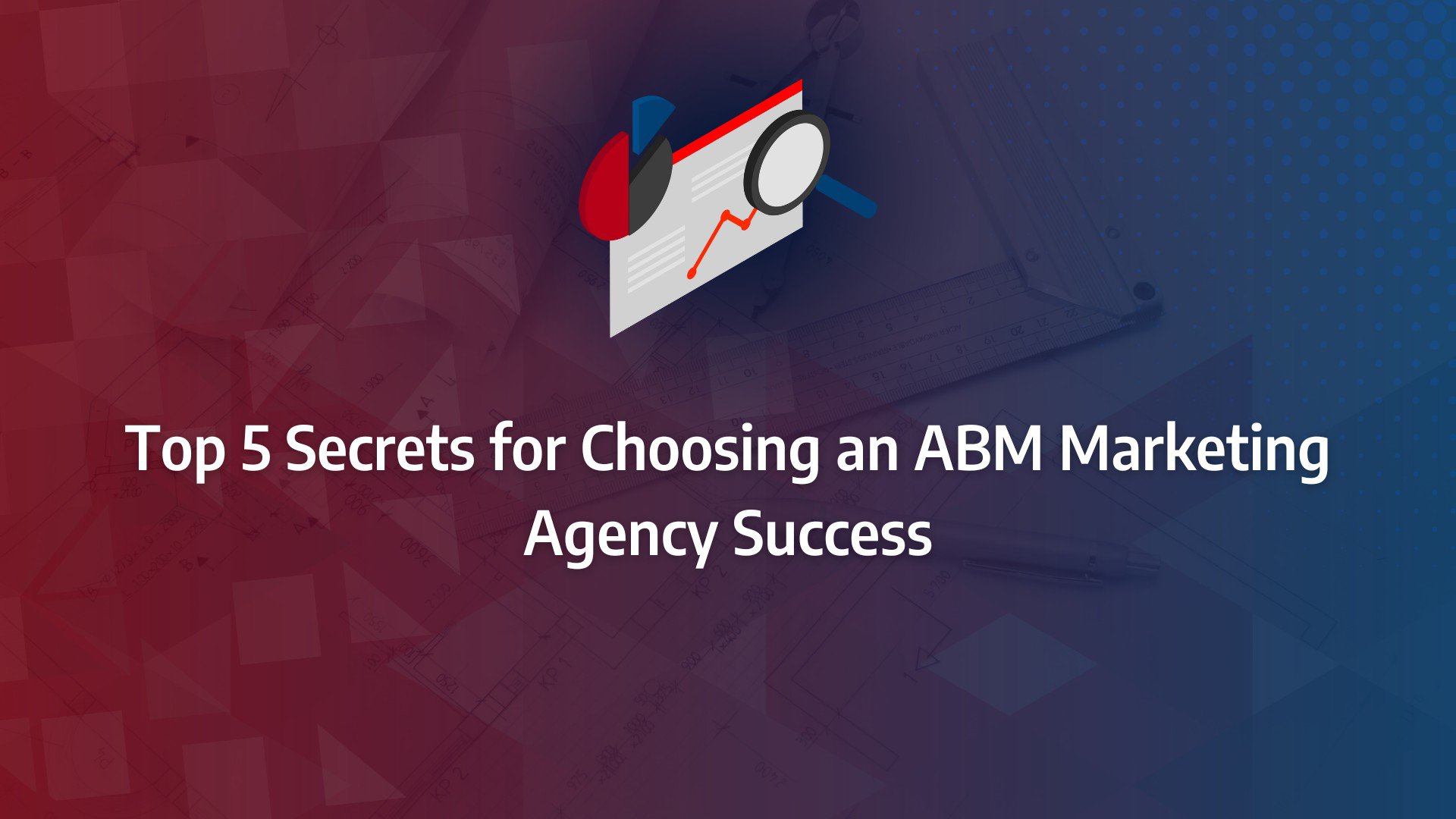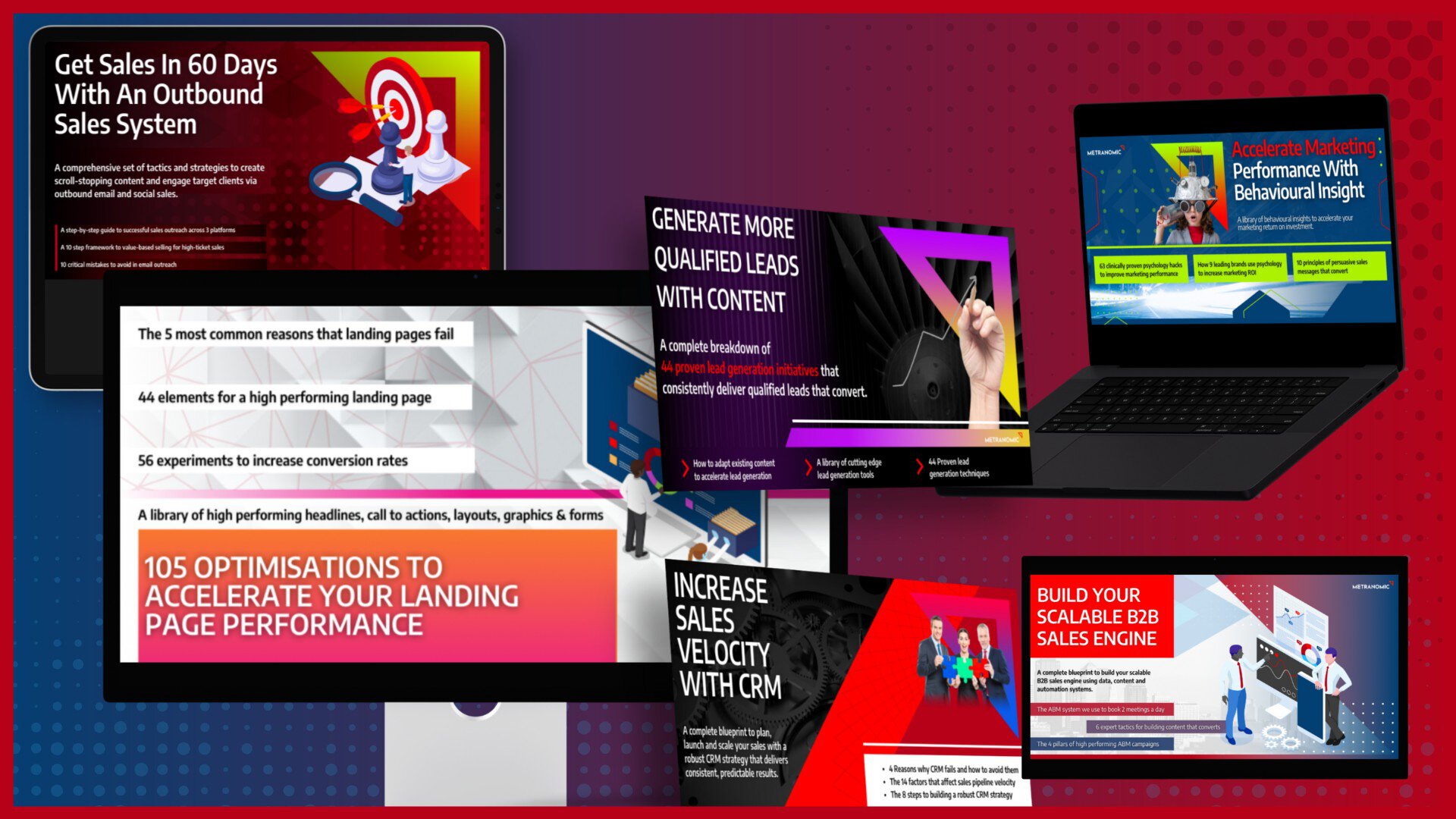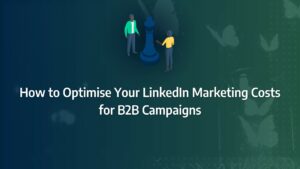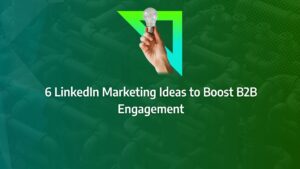When it comes to finding the right ABM marketing agency, many businesses often overlook key factors that define true success. An agency that goes beyond a simple framework and fully aligns its strategy with your company’s growth objectives can dramatically change your outcomes.
The most successful ABM agencies bring a personalised approach, fine-tuning every interaction to engage with your highest-value accounts. By leveraging data, optimising campaign orchestration, and evolving alongside market shifts, they drive measurable impact across every stage of the customer journey. But how can you identify a top-performing ABM agency? Let’s dive into the five key secrets that will ensure your success.
- A successful ABM agency designs a strategy that goes beyond a framework, creating tailored engagement journeys that resonate with your target accounts.
- Look for agencies that provide a customer-centric approach: Prioritising personalised messaging and ensuring hyper-relevance with your audience.
- MarTech mastery is crucial: Top agencies expertly integrate marketing technology to streamline campaigns and improve performance across the board.
- A comprehensive ABM strategy addresses all levels of the sales funnel: Driving engagement, retention, and increased sales.
- Prioritise agencies that offer clear communication and transparency: Ensuring continuous collaboration and campaign optimisation.
What Makes a Top-Performing ABM Marketing Agency Successful
When engaging with an ABM marketing agency, it’s essential to understand their role in driving a robust account-based marketing strategy. A top-performing ABM agency doesn’t just set up a framework; it designs a detailed account-based marketing journey that aligns every interaction with your target accounts. Before committing time, resources, or investment to execute a plan, an organisation must establish a clear strategy that focuses on how they will engage with, communicate to, and build meaningful relationships with their prospects and customers.
Any marketing plan demands a significant investment of time and energy. However, without a structured ABM framework, these efforts risk being misdirected, leading to suboptimal outcomes. ABM is underpinned by a blend of logic and data-driven methodologies, and a failure to define a clear strategy results in wasted resources and missed opportunities. A well-executed B2B ABM strategy does more than provide direction; it establishes processes that guide the organisation toward approaches that consistently deliver measurable results.
Take personalisation as an example. In account-based marketing, personalisation refers to tailoring messaging and engagements to specific individuals within your target accounts. A successful strategy outlines how to execute this personalisation effectively. Over time, as engagement data accumulates, personalisation efforts may need adjustment, whether through fine-tuning, enhancing, or pivoting the approach entirely.
Because ABM tactics are inherently dynamic, they must evolve with audience behaviour and market changes. Leveraging an ABM CRM allows agencies to track these shifts, providing visibility into the direction in which customer preferences are moving and enabling timely refinements to the campaign.
What Does an ABM Marketing Agency Do?
A top-tier ABM agency manages campaigns through a well-structured process that ensures every element is carefully orchestrated to maximise impact. Here are the key stages they oversee:
- Campaign Strategy
The first step is to define clear campaign goals and establish success metrics. The agency identifies which account groups and personas to target and selects the most effective channels and tactics for each phase of the campaign. This ensures that the strategy is aligned with both short-term wins and long-term growth objectives. - Campaign Flow and Orchestration Roadmap
Designing how each account interacts with the campaign activations is crucial. The agency crafts a flow that maps out the systems, touchpoints, and actions triggered by each engagement. This roadmap visualises the entire campaign’s timeline, ensuring that all activities are precisely timed and coordinated. - Accounts Prioritisation
Not all accounts are created equal. A competent ABM agency will review CRM data to ensure the necessary data points are in place for accurate segmentation. They then build lists of target accounts, drilling down into specific personas within each account to guarantee that outreach is tailored to key decision-makers and influencers. - Activations, Messaging, and Ads
Depending on the campaign type (e.g., webinars, ebooks), the agency will activate tailored content that aligns with the overall messaging framework. Personalisation is at the heart of this step—every ad, message, and interaction is crafted to resonate with the specific needs and pain points of the target personas. Ad creative is designed for each marketing channel to ensure consistency and engagement. - Campaign Setup
Once the activations are defined, the agency sets up the campaigns across all selected channels. This might involve scheduling organic social posts, launching paid media campaigns, designing and building landing pages, or setting up outbound email sequences. The goal here is to ensure every component is ready for execution without any friction. - Campaign Management
After launch, a top-performing ABM digital agency doesn’t sit back—they actively manage the campaign. Paid channels are continuously optimised to boost performance and lower costs, while email sequences are regularly reviewed for relevance and impact. Campaign performance is monitored and reported on, often on a weekly basis, to ensure ongoing improvements are made and objectives are met.
A successful ABM marketing agency does more than execute tasks—it actively collaborates with your business to refine and optimise strategies in real-time. Their expertise lies in their ability to adapt tactics based on performance data, ensuring that your campaign remains effective and aligned with evolving customer expectations.
Top 3 Benefits of Working with an ABM Marketing Agency
Building an account-based marketing (ABM) campaign independently is a challenging endeavour. It requires a team of specialists, each bringing their expertise to work together seamlessly. Collaborating with an experienced ABM marketing agency can transform your most pressing ABM challenges into tangible benefits.
1. Strategic and Systematic Approach
An ABM agency provides a comprehensive strategy, complete with a detailed roadmap to ensure your campaigns are sustainable and geared towards long-term revenue growth. A well-structured strategy takes into account everything from target account selection to personalised messaging, ensuring every aspect of the campaign aligns with your business goals.
Top Tip: Seek out an agency that adopts a customer-centric approach. They should be laser-focused on accurately identifying your target customer profiles and understanding their pain points. This focus ensures your ABM marketing plan will resonate with your audience and be delivered through the channels they engage with most. Without this deep understanding, your campaign is unlikely to achieve the hyper-personalisation necessary for success.
2. MarTech Mastery
One of the core strengths of an ABM agency lies in their mastery of marketing technology (MarTech). They not only alleviate the complexities of selecting the right tech solutions but also ensure all systems work cohesively within your existing tech stack. An agency will recommend the best, tried-and-tested tools for your specific needs, optimising them for maximum impact across your ABM campaign. This expertise removes the guesswork, ensuring every tool is integrated seamlessly to deliver measurable results.
3. More Leads and Sales
A well-rounded ABM digital agency employs a full-funnel marketing approach, ensuring you engage prospects at every stage of the customer journey—from initial awareness through to consideration, purchase, and even post-sale engagement. By addressing all levels of the sales funnel, an agency maximises the chances of acquiring new customers, retaining existing ones, and driving renewals and upsells. This structured approach to ABM enhances performance across the board, leading to improved lead generation and increased sales.
What Matters Most?
From our experience, one of the most effective strategies for account-based marketing (ABM) is building a community around your target accounts. Clients often discover that fostering connections through collaborative content and shared goals not only drives engagement but also strengthens relationships across the sales and marketing teams. Personalisation is another critical component; tailoring messaging for each account typically enhances resonance and connection. Clients who adopt this approach report higher engagement rates and improved loyalty. Additionally, leveraging data analytics allows organisations to uncover actionable insights into target accounts. By understanding the unique needs and behaviours of their prospects, clients can adjust their ABM strategies dynamically, ensuring maximum relevance and impact.Get In Touch
Key Skills and Attributes to Look for When Selecting an ABM Marketing Agency
How do I find a marketing agency?
Choosing the right ABM marketing agency is critical to the success of your account-based marketing strategy. A high-performing agency brings a unique combination of industry experience, technical expertise, and strong communication, all of which contribute to delivering a highly targeted and effective ABM campaign. Here are the key factors to consider when selecting an ABM agency that meets your needs.
Industry Experience
The first step in finding an agency is to look for one with proven experience in your industry. This ensures they have a solid understanding of your target audience, the challenges you face, and the dynamics of your market. An agency that knows your sector will be better equipped to design an ABM marketing agency strategy that resonates with your key accounts.
Start your search online, examining the agency’s website—does it rank well in search results? Is the content compelling, and do they effectively market themselves? Recommendations from other businesses or networking at relevant industry events can also help you discover agencies with a solid reputation.
Size and Service Offering
When evaluating agencies, consider their size and the scope of services they provide. Larger agencies often come with extensive resources and experience, but smaller agencies may offer a more tailored, personalised service. It’s essential to assess your specific needs and see if the agency offers a 360-degree approach to ABM digital agency services. A full-service agency will be able to support every aspect of your campaign, from strategy to execution.
Check their portfolio, and ask them for concrete examples of how they’ve helped businesses in your industry achieve similar goals. It’s also important to understand how they measure success and what metrics they’ll use to track your campaign’s performance. This will give you confidence that they have the ability to deliver results.
Culture and Communication
A good agency-client relationship extends beyond technical expertise—it’s also about cultural fit and open communication. The agency’s culture can significantly impact the success of your campaign, as a collaborative and creative environment fosters innovation and problem-solving.
Ask yourself: does the agency’s personality align with your company’s values? Would you feel comfortable working closely with them over an extended period? Chemistry matters, as does their approach to communication. Clear and consistent communication is essential to ensure you’re always informed about the progress of your campaign and any potential challenges. Regular meetings, whether through calls or email updates, will help ensure transparency and give you the confidence that your ABM agency is aligned with your objectives.
Skill Sets to Look for When Searching for an ABM Marketing Agency Partner
Finding the right ABM marketing agency partner is critical to building a successful account-based marketing strategy. The ideal agency must possess a range of skills that ensure both strategic foresight and technical execution. Below are the key skills you should look for when selecting your ABM partner.
Search Engine Optimisation (SEO) and Content Optimisation
Driving organic traffic is a cornerstone of digital marketing, and search engine optimisation (SEO) plays an essential role in this. For an ABM digital agency, SEO expertise is crucial in building a strong online presence for your brand.
SEO comprises two core elements: on-page and off-page SEO. On-page SEO focuses on optimising factors within your site, such as header tags, URL structure, meta tags, keyword placement, and page speed. Off-page SEO, on the other hand, involves building high-quality backlinks from trusted websites with strong domain authority, which can significantly improve your site’s ranking on Google.
With the rapid advancements in digital marketing, the fundamentals of SEO remain, but new tools are emerging that reshape how agencies approach optimisation. Voice-activated AI assistants like Alexa and Siri, for example, are increasingly important. Agencies optimising for voice search are ahead of the curve, ensuring your content is accessible to users across multiple platforms.
Additionally, artificial intelligence (AI) is revolutionising content creation by enabling agencies to scale up production, carry out advanced keyword research, and track real-time campaign performance. Agencies adept at leveraging AI are poised to deliver more precise, data-driven results.
Data-Driven Content Strategy
Content lies at the heart of every successful digital marketing strategy, and for any ABM marketing agency, a data-driven approach to content is vital. It starts with in-depth research to identify the topics that will resonate most with your target audience, while also accounting for current industry trends and content gaps.
Successful agencies take this research and create a structured content calendar that outlines the timing, type, and format of each piece of content to be produced. This process helps prevent overwhelm, especially when dealing with multiple content pillars across several platforms. A well-executed content calendar brings order and efficiency, ensuring your content aligns with both campaign goals and audience needs.
Tracking performance is another critical component. Your agency should be able to measure key metrics such as page views, engagement rates, and conversions to evaluate the effectiveness of content strategies. Continuous optimisation based on these insights helps drive improved ROI over time.
Social Media Marketing Expertise
Social media remains a powerful tool for lead generation, making it a must-have skill for any ABM agency. Managing social media platforms effectively requires a balance of creativity and strategy, as businesses must juggle organic and paid social tactics to maximise reach and engagement.
A strong ABM digital agency will leverage their expertise to amplify both types of strategies, ensuring brand recognition grows alongside engagement. By prioritising virality and shareability, your agency can help you build stronger brand awareness. Offering additional services like social listening tools and community management can further enhance your agency’s value, providing deep insights into audience sentiment and engagement trends.
Email Marketing Automation
In the world of digital marketing, email remains a highly effective channel for lead nurturing and customer retention. A skilled ABM agency should be able to craft segmented, automated email campaigns that keep your brand top of mind for prospects and clients alike.
Automated email marketing, especially in an ABM context, allows you to maintain continuous engagement without dedicating manual effort to every communication. By segmenting email lists based on customer behaviour, purchase history, or time since last interaction, you can ensure your messaging is personalised and targeted, increasing the likelihood of conversions.
Martech Expertise
The modern digital landscape is flooded with marketing technology solutions. A truly capable ABM marketing agency knows how to differentiate between the tools that genuinely drive performance and those that contribute to unnecessary complexity.
Evaluating MarTech tools based on scalability, integration capabilities, user-friendliness, and return on investment (ROI) is crucial. An agency with expertise in integrating APIs and understanding the tech stack’s interconnectivity can streamline your processes, reducing waste and optimising for efficiency. Agencies that stay ahead by incorporating emerging technologies like AI, no-code platforms, and Web3 offer a competitive edge, particularly for businesses looking to future-proof their marketing strategies.
Best Practices for Maximising Your Partnership with an ABM Marketing Agency
Not all account-based marketing (ABM) providers deliver the same level of expertise and results. Given that most B2B deals can take months, if not years, to close, it’s crucial to fully understand what you are getting from your ABM marketing agency. Below are five key questions to help you assess the strengths and potential gaps of your ABM partnership, ensuring you’re making the most of your investment.
1. Do You Provide Reporting at Both the Account and Contact Levels?
This is a deal-breaking question. If your ABM agency does not offer reporting at both the account level and the contact level, it’s time to reconsider the partnership. Successful ABM campaigns depend on influencing the right individuals within target accounts, and contact-level data is essential for this.
You may have a target account list, but B2B decisions are typically made by multiple stakeholders within a company. Therefore, understanding which key influencers have seen your ads is critical. Without this insight, your campaign data becomes a blunt instrument—much like viewing your entire marketing budget without knowing where the money is being spent.
2. Do You Use IP-Based Targeting or Cookie-Based Targeting?
This is one of the most important technical questions to ask your ABM digital agency. While it may sound like a small detail, the difference between IP-based and cookie-based targeting can drastically impact your campaign’s effectiveness.
IP-based targeting focuses on the IP addresses of employees’ work computers, which can limit your reach to in-office devices. This method doesn’t extend to personal computers or mobile devices, resulting in restricted cross-device reach. However, the more significant issue arises in persona targeting. IP-based targeting treats all employees at a company the same, meaning a CMO and an Events Coordinator may receive identical ads. This one-size-fits-all approach can seriously limit the precision of your targeting.
Conversely, cookie-based targeting allows for far more flexibility. It enables you to cherry-pick the exact individuals and roles you want to reach, personalising ad messaging to each. This method also allows for behavioural targeting and ensures your ads follow your audience across multiple devices throughout the day.
3. Do You Offer Personalised Ads and Personalised Websites?
A cornerstone of effective account-based marketing is delivering tailored messaging that aligns with each prospect’s role and stage in the sales funnel. In an ideal ABM campaign, your ABM agency should offer personalised ads, and where possible, drive prospects to personalised websites.
According to research from Salesforce, 84% of B2B buyers expect to be treated like individuals, not just another number. Personalisation isn’t just a luxury— it’s a necessity in today’s competitive landscape. Your ABM provider should enable this through persona-specific ads and bespoke landing pages.
While it’s possible to run an ABM campaign without personalising ads or websites, the cost of generic ads is often lower click-through rates and less effective engagements. If your ABM marketing agency cannot offer personalisation at the level required, it may lead to underperforming campaigns and missed opportunities.
Our Tactical Recommendations
From our experience, employing intent data strategically is vital for timely outreach in ABM campaigns. Clients often discover that by identifying buying signals, they can engage prospects at the right moment, increasing conversion chances. Furthermore, integrating marketing technology stacks effectively can streamline operations; ensuring all tools function together facilitates a cohesive ABM approach, which is crucial for managing complex campaigns. Lastly, establishing clear metrics for success is imperative. Clients typically gain better direction by defining key performance indicators (KPIs) from the outset, helping to align teams and measure the effectiveness of their ABM initiatives accurately.Get In Touch
Common Mistakes Businesses Make When Working with an ABM Marketing Agency and How to Avoid Them
Partnering with an ABM marketing agency can be transformative for your business, but there are common mistakes that many organisations make when managing these partnerships. Understanding these pitfalls and how to avoid them can help ensure that your collaboration delivers the results you need.
1. Not Defining Your Goals
One of the most significant mistakes is not having a clear idea of what you want to achieve. Without specific goals, it’s nearly impossible to find an ABM agency that aligns with your needs. It’s akin to embarking on a journey without a map— you may see some interesting things along the way, but you won’t reach your desired destination.
Start by outlining what you hope to accomplish with your ABM strategy. Are you aiming for increased website traffic, higher sales, or better brand awareness? Once your goals are clear, you can identify an agency that specialises in those areas, ensuring they have the right skills and experience to meet your objectives.
2. Choosing Based on Price Alone
Budget considerations are always important, but choosing an ABM digital agency solely on cost can lead to disappointment. Opting for the cheapest option might save money in the short term, but it often means compromising on quality. Agencies that charge less might lack the expertise, tools, or resources to deliver the level of service and results you expect.
Think of it as an investment in your business’s long-term growth. An agency that charges more but has a proven track record of delivering results will often offer better value over time. Prioritise an agency’s portfolio, client testimonials, and case studies over their price tag—focus on what they can achieve for you, not just what they charge.
3. Ignoring Agency Expertise and Track Record
It’s essential to partner with an agency that has experience in your industry. A generalist ABM marketing agency may offer solid services, but if they don’t understand the unique dynamics of your market, they may struggle to deliver effective results.
Before committing, research the agency’s past campaigns and ask for relevant case studies. Review client testimonials to gauge their ability to meet specific business needs. By ensuring your agency has a deep understanding of your sector, you’ll be more confident in their ability to drive your marketing goals.
4. Lack of Transparency and Reporting
If you’re not regularly informed about the progress of your campaigns, or your agency isn’t providing comprehensive reports, it’s a major red flag. An ABM agency should offer clear, actionable insights and set up dashboards to keep you updated. If you find yourself manually checking your campaigns without agency support, you’re not getting the service you deserve.
5. Constant Pressure to Increase Budgets
Another warning sign is an agency that continuously pushes for higher budgets without delivering improved performance. While increasing spend can enhance results in some cases, it shouldn’t be the agency’s default recommendation. Your ABM digital agency should focus on optimising the existing budget first and making recommendations based on data-driven insights.
6. No Proactive Suggestions for Improvement
A great ABM marketing agency doesn’t wait for you to ask for changes—they should constantly be seeking ways to improve your campaigns. If your agency isn’t providing fresh ideas or suggestions, and only responds to your requests, it’s a sign they may not be actively engaged in delivering the best results.
7. “Yes-People” Who Don’t Set Expectations
An agency that says “yes” to everything without offering caution or context isn’t doing you any favours. Real experts know what will work and what won’t, and they should be comfortable pushing back with evidence and alternative recommendations. You want an agency that sets realistic expectations and offers sound advice, not one that just agrees with every suggestion.
8. No Results After Three Months
If you’ve been working with an agency for over three months and are still far from your desired results—or seeing no results at all—it’s time to reassess the partnership. A well-structured ABM campaign should start showing progress within this time frame.
9. Lack of Understanding of Key Metrics
Within the first month or so of working with your agency, you should have a clear understanding of your conversion rates and the value of your leads and clients. If these metrics aren’t being tracked and reported, your agency isn’t giving you the insight you need to make informed decisions.
10. Constantly Changing Team Members
A revolving door of account managers and team members can indicate deeper issues within the agency, such as poor internal processes or low retention rates. Continuity is important—if your agency’s team is constantly changing, it’s a sign they may be struggling to deliver consistent results.
11. Abdicating Too Much Responsibility
While outsourcing your marketing to an agency is a way to bring in external expertise, it’s not a 100% hands-off solution. You still need to provide feedback, give direction, and collaborate. Leaving everything to the agency without active involvement can lead to disappointing outcomes. Remember, your agency isn’t embedded in your business and won’t always see the full picture unless you work with them closely.
12. Micro-Managing the Agency
On the flip side, micro-managing your agency can be just as damaging. If you require approval for every decision or constantly request work reports and updates, it can slow progress and create frustration on both sides. Trust in your agency’s expertise and allow them the space to deliver results, without getting bogged down in unnecessary details.
13. Website Issues That Hold Back Performance
Even the best ABM strategies can fail if they’re built on a weak website. Common issues include:
- Lack of Access: Your website’s conversion rate plays a significant role in the success of your marketing campaigns. If changes require approval from a third party, it can slow down optimisations and hurt performance.
- Security Problems: Website hacks are becoming more frequent, and they can take your site offline, significantly disrupting your marketing efforts.
- Technical Problems: Many websites rely on a fragile web of third-party plugins or custom code that can break when updates occur.
- Outdated Design: First impressions count. If your website doesn’t create a strong, positive impression, you’ll lose potential leads to competitors.
- Slow Load Speeds: Page load speed is an increasingly important factor in SEO and conversion rates. A slow website acts as a handbrake on your entire marketing strategy.







